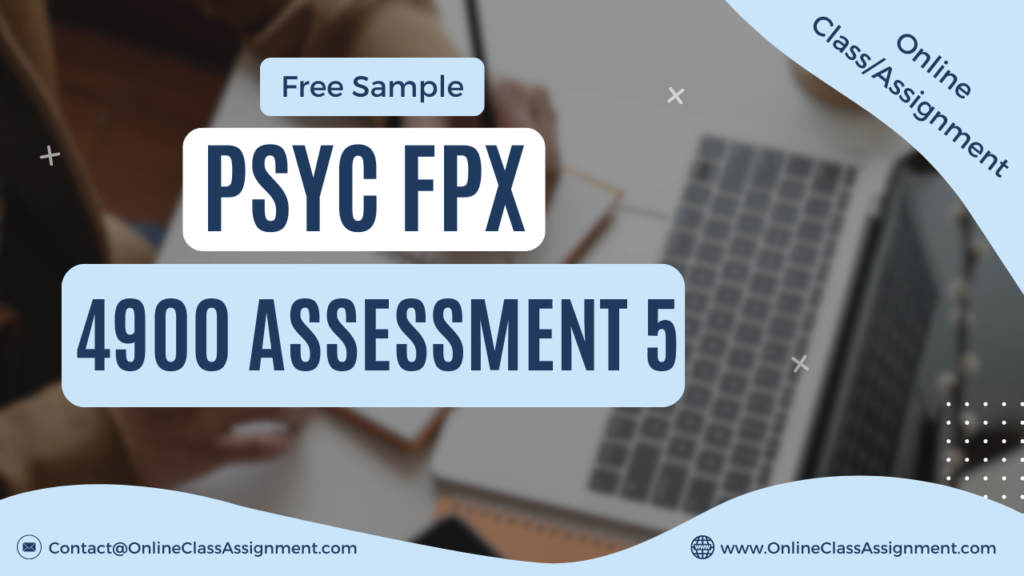PSYC FPX 4900 Assessment 5 A Mid-Life Career Change

PSYC FPX 4900 Assessment 5 A Mid-Life Career Change
Student Name
Capella University
PSYC FPX 4900 Psychology Capstone Project
Prof. Name
Date
A Mid-Life Career Change
The undergraduate FlexPath psychology program at Capella University has provided me with a comprehensive understanding of the science of psychology, serving as a foundation for my aspiration to become a mental health counselor specializing in addiction. Having dedicated much of my adult life to studying human behavior, this program has afforded me the opportunity to earn a degree in general psychology, paving the way for further academic pursuits. This paper reflects on the knowledge, skills, and values acquired through the program, self-assessment outcomes, and outlines my career goals and plans.
Assessment and Inventory Results
Reflecting on self-assessment and self-inventory exercises, several core values have emerged as significant contributors to my personal and career goals: creativity, flexibility, helping others, impact of work, and knowledge. These values align with my aspiration to transition into a career focused on counseling individuals struggling with addiction. Creativity and flexibility are deemed essential in adapting to the evolving landscape of counseling, particularly in teletherapy, a field of interest for me. Helping others and making a tangible impact through counseling are central to my professional fulfillment. Additionally, a continuous pursuit of knowledge underscores my commitment to personal and professional growth in the field.
Career Skills Inventory
According to the Career Skills Inventory, key skills crucial for my future role as an addictions counselor include coaching, counseling, information retrieval, active listening, and motivation. These skills are pivotal in fostering client growth and facilitating positive change in their lives. Strengthening these skills will be paramount as I embark on my career transition.
Goals and Career Plans
Driven by a lifelong passion for helping others, particularly individuals grappling with addiction, my career trajectory has been shaped by personal experiences and professional aspirations. Following the completion of my Bachelor’s degree in Psychology, I intend to pursue a Master’s degree in Child and Adolescent Development, focusing on the roots of addiction. Concurrently, I aim to undertake the Contemporary Theory in Addictive Behavior Certificate program to deepen my understanding of addiction dynamics. My ultimate goal is to obtain licensure as a mental health counselor, with a vision of establishing a private practice dedicated to addiction counseling.
Professional Philosophy
My professional philosophy underscores the importance of continuous learning, empathy, and empowerment. I believe in the transformative power of counseling to facilitate personal growth and foster resilience. By prioritizing client-centered approaches and ongoing self-improvement, I aspire to make a meaningful difference in the lives of those struggling with addiction.
Motivation
Motivational theories, particularly intrinsic and extrinsic motivation, serve as guiding principles in my pursuit of a career in counseling. Driven by an intrinsic desire to fulfill my potential and make a positive impact, I am committed to overcoming obstacles and embracing opportunities for growth. Self-actualization theory resonates deeply with my journey, as I endeavor to realize my true calling in the field of addiction counseling.
Action Plan
An action plan delineates the steps necessary to achieve my professional goals, including pursuing further education, gaining practical experience, and obtaining licensure. With a focus on setting SMART (Specific, Measurable, Achievable, Relevant, Time-bound) goals, I aim to complete my Master’s degree and specialty certificate programs within specified timeframes. Concurrently, I plan to seek employment within the behavioral health sector to gain firsthand experience and refine my counseling skills.
Conclusion
In conclusion, a strategic career plan and action plan are essential for realizing aspirations in the field of psychology and counseling. By aligning personal values with professional goals and committing to continuous growth, I am poised to embark on a fulfilling career journey as an addictions counselor. Through dedicated effort and a steadfast commitment to excellence, I aim to make a positive impact in the lives of individuals struggling with addiction.
References
Counselor-License. (2017). What are addiction counselors? Retrieved from http://www.counselor-license.com/careers/addictioncounselor.html#context/api/listings/prefilter
Feldman, R. S. (2017). Understanding psychology. New York, NY: McGraw-Hill Education.
Fenton, N. (2015). Using the ‘top 20 principles’. Retrieved from http://www.apa.org/ed/precollege/ptn/2015/09/top-20-principles.aspx
Howell, C. (n.d.). SMART Goals. Retrieved from http://media.capella.edu/coursemedia/UG099GS099/smart/smart_ts.html
PSYC FPX 4900 Assessment 5 A Mid-Life Career Change
Johnson, J. (n.d.). Work Values Card Sort. Retrieved from http://media.capella.edu/CourseMedia/CPLU1100_CPL5100/WorkValuesCardSort/work Values_ts.html
Kuther, T. L. (2016). The psychology major’s handbook (4th ed.). Boston, MA: Cengage Learning.
McKay, D. R. (2016). What is a mental health counselor? Retrieved from https://www.thebalance.com/what-is-a-mental-health-counselor-525395
Nivens, J., Balke, S., & Kruzic, M. (n.d.). Career Skills Inventory. Retrieved from http://media.capella.edu/CourseMedia/CPLU1100_CPL5100/CareerSkillsInventoryV3/transcript.html
Whitbourne, S. K. (2011). Motivation: The why’s of behavior. Retrieved from https://www.psychologytoday.com/blog/fulfillment-any-age/201110/motivation-the-whys-behavior
PSYC FPX 4900 Assessment 5 A Mid-Life Career Change
Get Capella University Free BS Psychology Samples
BIO FPX 1000
- BIO FPX 1000 Assessment 7 Media and Internet: Accurate vs Inaccurate
- BIO FPX 1000 Assessment 6 Patient Case Study Profiles – Cancer Causes
- BIO FPX 1000 Assessment 5 Genetics Lab
- BIO FPX 1000 Assessment 4 Digestion Lab
- BIO FPX 1000 Assessment 3 Urinary Lab
- BIO FPX 1000 Assessment 2 Neuromuscular Lab
- BIO FPX 1000 Assessment 1 Cardiovascular System Lab
COM FPX 1150
HIM FPX 4610
- HIM FPX 4610 Assessment 6 Health Topic Presentation
- HIM FPX 4610 Assessment 5 Discharge Summary: The Cardiorespiratory System
- HIM FPX 4610 Assessment 4 Operative Report: The Genitourinary System
- HIM FPX 4610 Assessment 3 Health Topic Approval
- HIM FPX 4610 Assessment 2 History and Physical (H&P): The Nervous System
- HIM FPX 4610 Assessment 1 Progress Note- The Skin
HIS FPX 1150
HUM FPX 1150
PSYC FPX 1000
PSYC FPX 2200
PSYC FPX 2300
